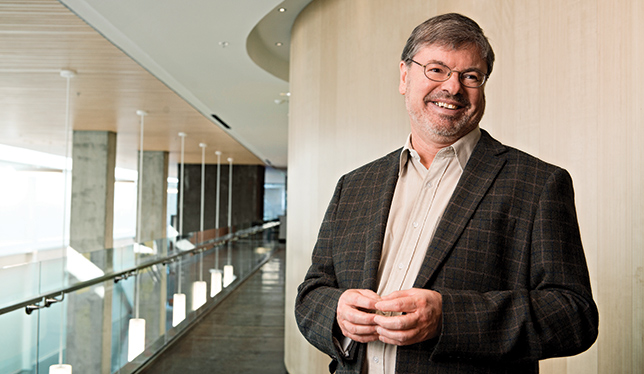The Natural Sciences and Engineering Research Council of Canada has awarded its top prize to a pioneering chemist at Dalhousie University. Axel Becke, holder of the Killam Chair in Computational Science, is the recipient of the Gerhard Herzberg Canada Gold Medal for Science and Engineering. He is credited with turning the “density-functional” theory of electronic motions in atoms, molecules and solids into an accurate and practical modeling tool. His methods have been incorporated into software packages used by researchers and engineers worldwide and the theory is now the most popular computational approach to the prediction of structures, energies, properties and mechanisms in physics and chemistry.
The medal comes with a grant of up to $1 million. Dr. Becke will direct part of this money to fund a new research position at Dalhousie. The first holder of the Herzberg-Becke Chair in Theoretical Chemistry will be Erin Johnson, a former student of Dr. Becke’s who will join Dalhousie’s faculty of science from the University of California. The chair will continue his work in computational chemistry.
“One of the qualities you need to really influence a field is perseverance – and I’ve had 30 years of perseverance on basically the same problem,” said Dr. Becke in a Dalhousie University press release. “We’re getting there. I can see the light at the end of the tunnel, but there’s still more work to do.”
He added that the award is a “huge honour” coming from an agency that has supported his research throughout his career. “To receive it towards the end of that career is really special.”
NSERC announced a number of other award winners today. Here is a partial list:
Chris Eliasmith, director of the Centre for Theoretical Neuroscience and the Canada Research Chair in Theoretical Neuroscience at the University of Waterloo was honoured with the NSERC John C. Polanyi Award (up to $250,000) for Canadian-based research that has led to outstanding advances in the natural sciences or engineering. Dr. Eliasmith has an interdisciplinary academic background that includes engineering, philosophy, psychology and neuroscience. He is known internationally for the human-like Spaun, a computer program made up of 2.5 million virtual neurons, a simulated eye and arm.
The Brockhouse Canada Prize for Interdisciplinary Research in Science and Engineering (up to $250,000), which recognizes interdisciplinary Canadian research teams, went to Paul Schaffer, principal investigator at TRIUMF, the national laboratory for particle and nuclear physics; François Bénard, the B.C. Leadership Chair in Functional Cancer Imaging with the University of British Columbia; Anna Celler, head of the medical imaging research group at the UBC; Michael Kovacs, assistant professor of medical imaging and biophysics and Western University; Thomas J. Ruth, special advisor emeritus at TRIUMF; and John Valliant, professor of medical physics and applied radiation sciences at McMaster University.
Synergy Awards for Innovation, which recognize collaborative work between a postsecondary institution and Canadian industry, offer a $200,000 research grant to the winning school and a $30,000 voucher for the industry partner to use towards a Collaborative Research and Development Grant.
- Small- to medium-sized enterprise category: Carey Simonson and Robert W. Besant (University of Saskatchewan) and Manfred Gerber of Venmar CES Inc. for a new commercial heating, ventilation and air conditioning system that significantly reduces both costs and greenhouse gas emissions
- Large company: David Blowes (University of Waterloo), Richard Amos (Carleton University), David Sego (University of Alberta), Leslie Smith (UBC) and Gord MacDonald (Diavik Diamond Mines) for a research program leading to better mine waste management in Canada’s North.
- Two or more companies: Claire Deschênes (Université Laval), Normand Désy (Andritz Hydro Ltée), Anne-Marie Giroux (Hydro-Québec), Michel Sabourin (Alstom Énergies Renouvelables Canada Inc.), Robin Sinha (Natural Resources Canada), Luc Deslandes (Voith Hydro Inc.) for ULaval’s Consortium on Hydraulic Machines, a leading global centre on turbine research.
- Colleges ($100,000-grant for school, $20,000 grant voucher for partner): David Humphrey (Seneca College) and Mark Surman (Mozilla Foundation)
E.W.R Steacie Memorial Fellowships ($250,000, two years) support the career development of promising researchers and faculty members at Canadian universities. The recipients are:
- Daniel Ansari, Western University (psychology), to support his work on why some kids stuggle learning math
- Steven J. Cooke, Carleton University (biology, environmental science), for pioneering the emerging field of conservation physiology
- Leah Cowen, University of Toronto (molecular genetics), for research on how some fungi become drug-resistant
- Jiangchuan Liu, Simon Fraser University (computing science), for making mobile networks and peer-to-peer sharing networks faster and more reliable
- Aaron Wheeler, U of T (chemistry), for her development of digital microfluidics to more easily test newborns for diseases
- Wei Yu, U of T (electrical and computer engineering), for continuing to make Internet connections more powerful and efficient
